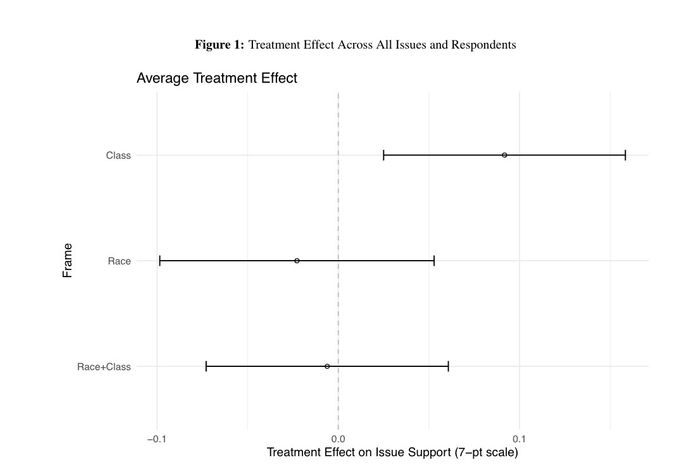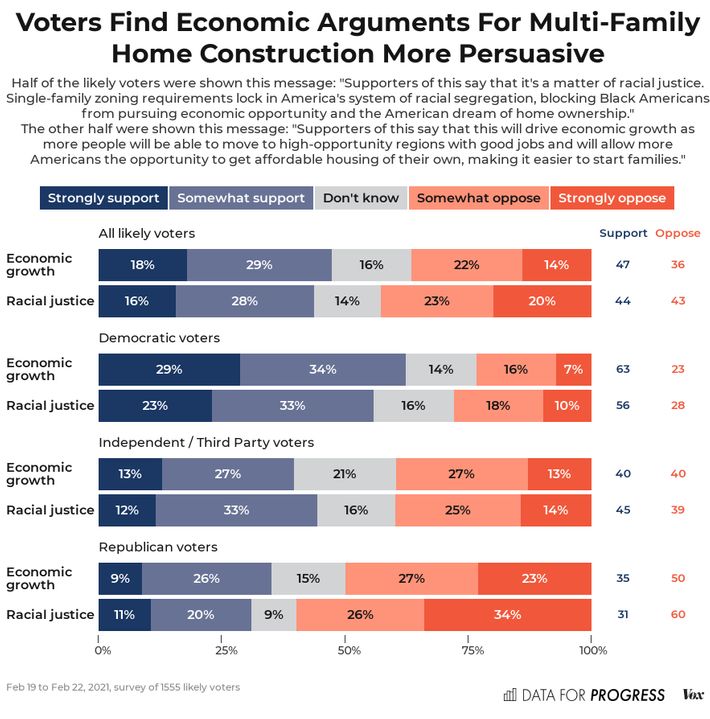
Beginning about a decade ago, the Democratic Party went through two important changes related to racism. The first is that the backlash against Barack Obama made far more white liberals aware of how deeply racial resentment inspired American conservatism. (Black people had by and large realized this all along.)
The second is that the party, which in previous years had painstakingly avoided the impression its agenda was mainly designed to help minorities, began emphasizing this very point. That change occurred in 2016, when Hillary Clinton started infusing her rhetoric with conscious appeals to racial equity. And it continued in 2020 — even though Joe Biden employed less race-conscious rhetoric than his more progressive rivals, he still cast some of his plans as explicitly anti-racist.
But is it working? Yale political scientists Micah English and Josh Kalla have found that adding explicitly race-conscious ideas to Democratic messages reduces their support. English and Kalla’s experiment borrows real-world messages from Democratic politicians and tests them with both a race-conscious component and a mix of race and class messaging. In either instance, telling subjects that a proposal would reduce racial inequity makes them less likely to support it:
This is not a completely novel finding. Vox reporter Jerusalem Demsas, working with polls from Data for Progress, found that describing measures to permit more housing construction as a way to reduce segregation and promote racial justice made respondents much less likely to support them:
What’s odd about this result is that it shouldn’t come as a surprise. Indeed, the conclusion that race-conscious messages backfire is a direct corollary of the premise that racism is a potent force in American life. Of course Republicans are going to try to convince voters that any Democratic proposal is mainly designed to help Black people. And of course those messages, sometimes subtle, will push white people away from the Democrats, even if those white people aren’t explicitly identifying as racists. Racism is a potent force in American life.
The mechanism that has led Democrats to embrace race-conscious messaging seems to be entirely internal. As white liberals have grown more aware of racism, they have rewarded politicians who cater to their newfound awareness by explicitly promising racial justice. This has opened the door to redefining large swaths of the Democratic policy agenda. After all, many problems in American life disproportionately harm Black people: unemployment, lack of health insurance or child care, exposure to environmental harm, and so on. Most reforms that increase equality in general also increase racial equality.
Obama was well aware that creating more access to health insurance would disproportionately benefit minorities. He rarely mentioned that in public. It was Republicans who went out of their way to make white people think of health-care reform as a transfer to Black America. (“This is a civil rights bill, this is reparations, whatever you want to call it,” said Rush Limbaugh. “I think Mr. Obama allows historical grievances — things like slavery, bad treatment for Native Americans and U.S. exploitation of Third World countries — to shape his economic thinking …” warned Bill O’Reilly. “He gives the bad things about America far too much weight, leading to his desire to redistribute wealth, thereby correcting historical grievance.”)
Describing Democratic policies as a redress of racism makes perfect sense within progressive spaces. Many of these race-conscious messages are designed by progressives for the benefit of other progressives. (Matthew Yglesias argues that competition for progressive funding dollars, some of which are earmarked for anti-racist causes, is a motivating factor.) And framing one’s position as anti-racist certainly feels righteous and good to people with liberal views on race.
But the only world in which that strategy is going to be effective is one in which most non-Black people are very happy to make sacrifices in order to promote racial justice — which is to say, a world in which racism has been largely eradicated. But that isn’t the actual world we live in. Somehow, white liberals becoming more aware of racism has driven the Democratic party to start acting as if racism isn’t real.
































